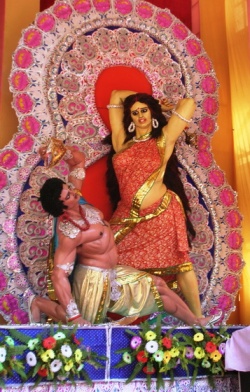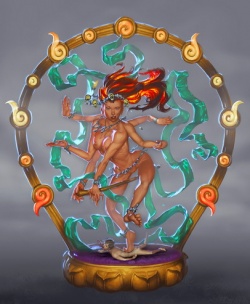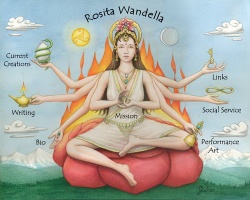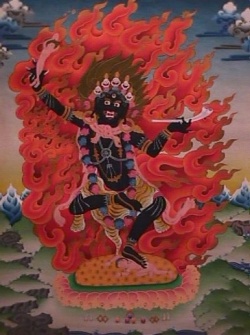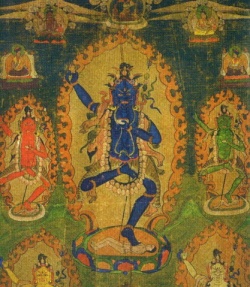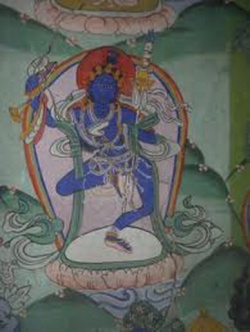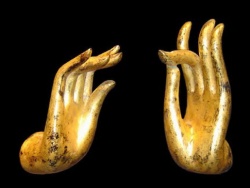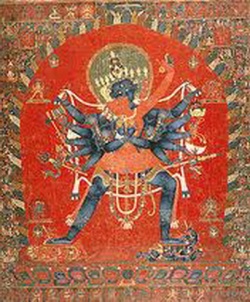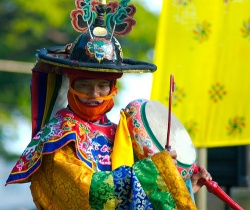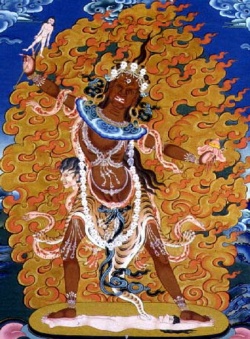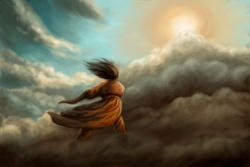Difference between revisions of "Tilopa Meets the Dakinis"
m (Text replacement - "repository" to "repository") |
|||
| (2 intermediate revisions by one other user not shown) | |||
| Line 1: | Line 1: | ||
| − | All dakinis have extraordinary powers -- the worldly ones and those referred to as wisdom dakinis -- but only the motivation of the latter is completely pure. The life story of the Mahasiddha, Tilopa (988 - 1069) tells how after he met the dakinis who could manipulate appearances, he encountered the ones embodying the five activities, and then at last, in the heart of the mandala, The Wisdom Dakini, herself. The Life of Padmasambhava According to Yeshe Tsogyal describes a similar progression. | + | [[File:Dakini Fatakeshto.JPG|thumb|250px|]] |
| − | Tilopa Meets the Dakinis | + | All [[dakinis]] have [[extraordinary]] [[powers]] -- the [[worldly]] ones and those referred to as [[wisdom]] [[dakinis]] -- but only the [[motivation]] of the latter is completely [[pure]]. The [[life]] story of the [[Mahasiddha]], [[Tilopa]] (988 - 1069) tells how after he met the [[dakinis]] who could {{Wiki|manipulate}} [[appearances]], he encountered the ones [[embodying]] the five [[activities]], and then at last, in the [[heart]] of the [[mandala]], The [[Wisdom]] [[Dakini]], herself. The [[Life]] of [[Padmasambhava]] According to [[Yeshe Tsogyal]] describes a similar progression. |
| − | The 4th Chetsang Rinpoche (1770-1862) of the Drikung Kagyu tells how the Bengali brahmin boy, Salyeu, out minding water buffalo, was visited by a "fearsome, ugly woman" who told him to ". . . herd buffalo And read scriptures. There you will find the prophecies of the Dakinis." | + | [[Tilopa Meets the Dakinis]] |
| + | The 4th Chetsang [[Rinpoche]] (1770-1862) of the [[Drikung Kagyu]] tells how the {{Wiki|Bengali}} [[brahmin]] boy, Salyeu, out minding [[water]] {{Wiki|buffalo}}, was visited by a "fearsome, ugly woman" who told him to ". . . herd {{Wiki|buffalo}} And read [[scriptures]]. There you will find the {{Wiki|prophecies}} of the [[Dakinis]]." | ||
With this, she disappeared. | With this, she disappeared. | ||
| − | |||
| − | |||
| − | |||
| − | |||
| − | |||
| − | |||
| − | |||
| − | |||
| − | |||
| − | |||
| − | |||
| − | |||
| − | |||
| − | |||
| − | |||
| − | |||
| − | |||
| − | |||
| − | |||
| − | |||
| − | |||
| − | + | Some [[time]] later, while he was reading under a shapa [hat-shaped?] [[tree]], she returned, and asked him to identify himself to her. He gave the appropriate, ordinary [[information]], but she corrected him, saying: | |
| − | + | "Your country is [[Oddiyana]] in the [[North]]; your father is [[Chakrasamvara]]; your mother is [[Vajrayogini]]: your brother is Pantsapana [Hind: Panchpana], and I am your sister, Bliss-giver. If you want to find the true {{Wiki|buffalo}} go to the {{Wiki|forest}} of the [[bodhi tree]]. There the stainless [[Dakinis]] hold the ear-whispered teachings." | |
| − | + | He said, "If I go there, the [[Dakinis]] will pose {{Wiki|obstacles}} and prevent me from succeeding." | |
| − | + | ||
| − | + | She said: "[[Yogi]], you can get the teachings. You have received the predictions And kept the [[samaya]] [[vows]]." | |
| − | + | [[Realizing]] she was a [[Dakini]], he said: "The [[path]] is [[dangerous]] and I do not know how to traverse it." | |
| − | + | In reply she gave him a {{Wiki|crystal}} ladder, a jeweled bridge, and a coral-handled key, saying: "I give you my [[blessings]]; depart without hesitation." | |
| − | + | The young man, who would become known as [[Mahasiddha]] [[Tilopa]], then crosses the country to reach [[Oddiyana]] where, using the [[magical]] tools, he negotiates a [[poison]] lake and the "{{Wiki|iron}} wall of Ghandola." Then, he chooses the correct one of the three gates to the [[Temple]] of Ghandola and, using his coral key, he enters. | |
| − | + | ||
| + | First, he meets [[nirmanakaya]] "stainless [[Dakinis]] Who [[desire]] flesh and {{Wiki|blood}}." in their many fearsome [[forms]] that make terrible noises and threatening gestures, but he is not afraid. Frustrated, they fell into a faint, and when they regained their composure, they begged his [[forgiveness]] and admitted: | ||
| + | "We are to you as the butterfly to the [[lamp]]; The butterfly [[Wikipedia:Hope|hopes]] to extinguish the [[lamp]], But instead [[dies]] in the [[light]]. ... , ... ." | ||
| + | One among them continued: "I am just an ordinary being, without authority. If I do not ask our leader's permission to let you in, She will eat my flesh and drink my {{Wiki|blood}}. Therefore, [[precious]] one, do not think unkindly of me." | ||
| + | [[File:Dakini mog2.jpg|thumb|250px|]] | ||
| + | Then, [[samboghakaya]] [[Loka]] [[Karma]] [[Dakinis]] appear, but by making the three threatening [[ritual]] gestures, [[Tilopa]] overpowers their [[faculties]] of [[body]], [[speech]] and [[mind]]. They [[suffer]] the same as the previous group, and their leader, "a Minister," goes to announce him to the {{Wiki|Queen}}. When she permits him to enter, he does not even [[bow]] but rather assumes a state of [[meditation]], so the host of attending [[Dakinis]] get [[angry]], saying: | ||
| + | "She is the [[blessed one]], The mother of the [[Buddhas]] of the Three Times. Let us beat him Who shows no [[respect]]." | ||
| + | The Mother intervenes saying that he is ". . . . The father of the [[Buddhas]] of the Three Times. Even a [[rain]] of [[vajras]] . . . Could not destroy him. Therefore I will give him the teachings." | ||
| − | + | She instructs him in [[prana]] [breath/energy] and other unrecorded things, but he insists on more, and [[Tilopa]] says that he wants " . . . the [[perfect teaching]]. The stainless [[bliss]], the great secret Of the ordinary and the [[extraordinary]]." | |
| − | + | She then agrees to confer the three wish-fulfilling [[gems]] including the self-arising [[body]] of co-emergent [[Wisdom]] and Means united; the [[speech]] that is the 7-syllable self-arising {{Wiki|emerald}} in the [[Dharmakara]], and the 5-pointed [[vajra]] [[jewel]] of self-arising [[mind]], but only if he can understand the [[signs]]. The host of [[Dakinis]] express their [[doubt]] that he will be able to understand the [[signs]], but [[Tilopa]] responds directly to the Mother, that he has 3 special keys, and that they are: | |
| − | + | 1. The [[self-liberation]] key of [[samaya]] that grants access to "the [[light]] of [[wisdom]] which dispels the darkness of [[ignorance]], And to [[self-awareness]], self-arising, ad self-clarity." | |
| − | + | 2. "the key of [[experience]] Which opens the door to the mind-as-such, Self-appearing clarity which is ever {{Wiki|unborn}}, . . . ." and | |
| − | + | 3. "the key of [[experience]] of the [[realized]] [[yogi]]" that opens the door to "Mind-as-such, Dharma-as-such, and [[Dharmakaya]]." | |
| − | + | At that the [[Dakinis]] rejoice and hold a [[Ganachakra]] feast in which they prepare the sindhura (vermillion powder) [[mandala]] and further empower him by means of both oral and [[mental]] transmissions. They give him 13 {{Wiki|distinct}} [[tantras]] for the future [[benefit]] of [[beings]] including [[Tantra]] of [[Vajra]] [[Dakini]], [[Tantra]] of Sangwai Zo and [[Tantra]] of [[Vajradhara]] Self-appearance. Then they liken him to a {{Wiki|bird}} and, having addressed him as [[Chakrasamvara]] and as Prajnabadra, they beg him to remain with them. | |
| + | [[Knowing]] the future, [[Tilopa]] explains that he must return to Tsukgi Norbu (Crest [[Jewel]]) [[Monastery]] "For the [[spiritual]] sons [[Naropa]], Ririkasori and others." | ||
| + | As he was leaving, a [[formless]] [[Dakini]] bestowed 9 special [[objects]] with instructions to: | ||
| + | [[File:Dakini rose.jpg|thumb|250px|]] | ||
| + | * 1. "loosen the knot of the [[mind]]" | ||
| + | * 2. "act like a sword striking [[water]]" | ||
| + | * 3. "chase the {{Wiki|sun}} of [[realization]]" [a lasso?] | ||
| + | * 4. "see [[samaya]] in the [[mirror]] of your [[mind]]" | ||
| + | * 5. "see that the [[light]] of [[awareness]] is [[wisdom]]" | ||
| + | * 6. "turn the [[wheel]] of the channel and [[wind]] net" | ||
| + | * 7. "see the outer [[mirror]] equalizing {{Wiki|taste}}" | ||
| + | * 8. "see the [[mahamudra]] [a seal?] of [[self-liberation]]" | ||
| + | * 9. hold "the [[jewel]] of great-bliss [[speech]]" | ||
| + | And that, according to the [[Drikung Kagyu]], is "how [[Tilopa]] as a [[human being]] over- powered the [[Dakinis]], and how he received the teachings. " | ||
| + | [[Consorts]] of [[Transcendent]] [[Buddhas]] | ||
| + | [[Tibetan Buddhism]] acknowledges, besides the [[historical Buddha]] [[Siddhartha Gautama]] [[Shakyamuni]] (532-486 BCE) other [[buddhas]] ([[awakened]] ones/fully aware ones) of the past and the future. At the [[Wikipedia:Absolute (philosophy)|ultimate]] level of [[reality]] there are [[transcendental]] [[buddhas]]. These are [[thought]] of as [[five families]] or categories of [[buddhas]]. | ||
| + | Their {{Wiki|female}} [[consorts]] are regarded as "[[enlightened]] [[wisdom]]" which, paired with the {{Wiki|male}} aspect or "[[skillful means]]," give rise to the [[enlightened]] [[compassionate]] [[activity]] of the universe(s). Hence there are 5 major corresponding [[dakinis]]: Padma-Dakini, Buddha-Dakini, Ratna-Dakini, Karma-Dakini, and Vajra-Dakini or Vishva-Dakini (vajra-cross [[dakini]].) | ||
| + | [[Dakinis]] of the [[Five Families]] | ||
| + | |||
| + | The [[Padma]] or [[lotus]] [[dakini]] is stocky with oily, pink {{Wiki|skin}}. | ||
| + | [[File:Black Dakini14.jpg|thumb|250px|]] | ||
She is talkative and lusty. | She is talkative and lusty. | ||
| − | She controls gods, demons and men. | + | She controls [[gods]], {{Wiki|demons}} and men. |
| − | With her, the doors to rebirth in lower realms are closed. | + | With her, the doors to [[rebirth]] in [[lower realms]] are closed. |
| − | Buddha (Sangye) dakini is bluish white. | + | [[Buddha]] (Sangye) [[dakini]] is bluish white. |
She is smiling, placid and long-lived. | She is smiling, placid and long-lived. | ||
| − | She confers longevity and rebirth in the dakini paradise. | + | She confers longevity and [[rebirth]] in the [[dakini]] [[paradise]]. |
| − | Ratna or jewel dakini is tall, slim, golden- skinned with white hair. | + | [[Ratna]] or [[jewel]] [[dakini]] is tall, slim, golden- skinned with white [[hair]]. |
She sings and dances. | She sings and dances. | ||
| − | She grants wealth and success in life. | + | She grants [[wealth]] and [[success]] in [[life]]. |
| − | With her the hell realms will be closed. | + | With her the [[hell realms]] will be closed. |
| − | The Karma or activity dakini is white and radiant. | + | The [[Karma]] or [[activity]] [[dakini]] is white and radiant. |
She is smiling, respectful, | She is smiling, respectful, | ||
trustworthy, and generous. | trustworthy, and generous. | ||
| − | + | [[File:BlackDakini47oi.jpg|thumb|250px|]] | |
| − | She grants worldly success and rebirth as a human. | + | She grants [[worldly]] [[success]] and [[rebirth]] as a [[human]]. |
| − | Vajra (Dorje) or thunderbolt dakini is fair, flushed and radiant. | + | [[Vajra]] ([[Dorje]]) or [[thunderbolt]] [[dakini]] is fair, flushed and radiant. |
She has special marks such as 5 white moles at her brow. | She has special marks such as 5 white moles at her brow. | ||
| − | Compassionate, pure, virtuous and devout, with her there is no falling into any lower realm. | + | [[Compassionate]], [[pure]], [[virtuous]] and devout, with her there is no falling into any lower [[realm]]. |
| − | [From John Stevens' Lust for Enlightenment (Shambala 1990) citing Dowman's Divine Madman.] | + | [From John Stevens' [[Lust]] for [[Enlightenment]] ([[Shambala]] 1990) citing Dowman's [[Divine]] Madman.] |
or Four Orders | or Four Orders | ||
| − | The Sanglingma or Life of Padmasambhava According to Yeshe Tsogyal repeatedly makes reference to four orders.The lowest order of dakini consists of beings who have not fully divorced themselves from the world of existence, samsara. This worldly kind of dakini is the sort that may behave like Tricksters -- sometimes helpful; at other times, mischief-making. These dakinis can appear as beautiful fairies or angels, but also as ghouls and demons. | + | The Sanglingma or [[Life]] of [[Padmasambhava]] According to [[Yeshe Tsogyal]] repeatedly makes reference to four orders.The lowest order of [[dakini]] consists of [[beings]] who have not fully divorced themselves from the [[world]] of [[existence]], [[samsara]]. This [[worldly]] kind of [[dakini]] is the sort that may behave like Tricksters -- sometimes helpful; at other times, mischief-making. These [[dakinis]] can appear as beautiful {{Wiki|fairies}} or {{Wiki|angels}}, but also as ghouls and {{Wiki|demons}}. |
or Five Sisters | or Five Sisters | ||
| − | In the life story of Padmasambhava, The 5 Tsering-ma were transformed from evil-doers who could manipulate beings by means of visual and auditory illusions into sworn and bound protectors of the dharma by the Guru.From Thinley Norbu's Magic Dance: The Display of the Self-Nature of | + | In the [[life]] story of [[Padmasambhava]], The 5 Tsering-ma were [[transformed]] from evil-doers who could {{Wiki|manipulate}} [[beings]] by means of [[visual]] and {{Wiki|auditory}} [[illusions]] into sworn and bound [[protectors]] of the [[dharma]] by the Guru.From Thinley Norbu's [[Magic]] Dance: The Display of the Self-Nature of |
| − | the Five Wisdom Dakinis. (Shambhala, 1999): | + | the [[Five Wisdom Dakinis]]. ([[Shambhala]], 1999): |
| − | : Five Wisdom Sisters, | + | : Five [[Wisdom]] Sisters, |
: If we do not complement you, | : If we do not complement you, | ||
: You become five witches, | : You become five witches, | ||
| − | : Making us ill and bringing us suffering. | + | : Making us ill and bringing us [[suffering]]. |
: Because we cannot banish you, | : Because we cannot banish you, | ||
| − | : Always our fate depends on you. | + | : Always our [[fate]] depends on you. |
| − | + | [[File:Blue Dakini -es.jpg|thumb|250px|]] | |
| − | : Five Wisdom Sisters, | + | : Five [[Wisdom]] Sisters, |
: If we do complement you, | : If we do complement you, | ||
| − | : You become five angels, | + | : You become five {{Wiki|angels}}, |
| − | : Making us healthy and bringing us happiness. | + | : Making us healthy and bringing us [[happiness]]. |
: Because we cannot separate from you, | : Because we cannot separate from you, | ||
| − | : Always our fate depends on you. | + | : Always our [[fate]] depends on you. |
| − | : Five Wisdom Sisters, | + | : Five [[Wisdom]] Sisters, |
| − | : Nothing can be done without depending on your mood. | + | : [[Nothing]] can be done without depending on your mood. |
| − | : Farmers cannot grow their crops, | + | : {{Wiki|Farmers}} cannot grow their crops, |
: Politicians cannot rule their countries, | : Politicians cannot rule their countries, | ||
: Engineers cannot work their machines, | : Engineers cannot work their machines, | ||
| − | : Doctors cannot heal their patients, | + | : [[Doctors]] cannot heal their patients, |
| − | : Scientists cannot do their research, | + | : [[Scientists]] cannot do their research, |
| − | : Philosophers cannot make their logic, | + | : [[Philosophers]] cannot make their [[logic]], |
| − | : Artists cannot create their art, | + | : {{Wiki|Artists}} cannot create their [[art]], |
: Without depending on your mood. | : Without depending on your mood. | ||
| − | : Five Wisdom Sisters, | + | : Five [[Wisdom]] Sisters, |
| − | : Nothing can be known without depending on your grace. | + | : [[Nothing]] can be known without depending on your grace. |
| − | : Tibetan lamas cannot chant with cool highland habit, | + | : [[Tibetan]] [[lamas]] cannot [[chant]] with cool highland [[Wikipedia:Habit (psychology)|habit]], |
| − | : Indian gurus cannot sing with warm lowland habit, | + | : [[Indian]] [[gurus]] cannot sing with warm lowland [[Wikipedia:Habit (psychology)|habit]], |
| − | : Japanese roshis cannot sit with dark cushion habit, | + | : [[Japanese]] roshis cannot sit with dark cushion [[Wikipedia:Habit (psychology)|habit]], |
| − | : Muslim sheikhs cannot dance with bright robed habit, | + | : {{Wiki|Muslim}} sheikhs cannot dance with bright robed [[Wikipedia:Habit (psychology)|habit]], |
| − | : Jewish rabbis cannot pray with soft-voiced habit | + | : {{Wiki|Jewish}} rabbis cannot pray with soft-voiced [[Wikipedia:Habit (psychology)|habit]] |
: Without depending on your grace. | : Without depending on your grace. | ||
| − | : Five Wisdom Sisters, | + | : Five [[Wisdom]] Sisters, |
| − | + | [[File:Buddha-hands.jpg|thumb|250px|]] | |
| − | : Even the most mysterious miracles cannot occur without complementing your purity. | + | : Even the most mysterious [[miracles]] cannot occur without complementing your [[purity]]. |
| − | : Buddha Shakyamuni cannot rest with tranquil gaze of his lotus eyes underneath the Bodhi tree, | + | : [[Buddha Shakyamuni]] cannot [[rest]] with [[tranquil]] gaze of his [[lotus]] [[eyes]] underneath the [[Bodhi tree]], |
| − | : Guru Padmasambhava cannot play magically with countless sky-walking dakinis, | + | : [[Guru Padmasambhava]] cannot play magically with countless sky-walking [[dakinis]], |
| − | : Lord Jesus cannot walk weightlessly across the water, | + | : [[Lord]] {{Wiki|Jesus}} cannot walk weightlessly across the [[water]], |
: Prophet Moses cannot see the radiantly burning bush, | : Prophet Moses cannot see the radiantly burning bush, | ||
| − | : Brahmin Saraha-pa cannot straighten arrows, singing wisdom hymns with his arrow-maker girl, | + | : [[Brahmin]] Saraha-pa cannot straighten arrows, singing [[wisdom]] hymns with his arrow-maker girl, |
| − | : Crazy saint Tilopa cannot eat fish and torture Naropa, | + | : Crazy [[saint]] [[Tilopa]] cannot eat {{Wiki|fish}} and torture [[Naropa]], |
| − | : Greatest yogi Milarepa cannot remain in his cave, singing and accepting hardships | + | : Greatest [[yogi]] [[Milarepa]] cannot remain in his {{Wiki|cave}}, singing and accepting {{Wiki|hardships}} |
| − | : Without complementing your purity. | + | : Without complementing your [[purity]]. |
: You are so patient. | : You are so patient. | ||
: Whoever wants to stay, | : Whoever wants to stay, | ||
| − | : If you don't exist, | + | : If you don't [[exist]], |
: Cannot stay. | : Cannot stay. | ||
: Whoever wants to go, | : Whoever wants to go, | ||
| − | : If you don't exist, | + | : If you don't [[exist]], |
: Cannot go. | : Cannot go. | ||
| − | : Whoever wants to taste or touch, | + | : Whoever wants to {{Wiki|taste}} or {{Wiki|touch}}, |
| − | : If you don't exist, | + | : If you don't [[exist]], |
| − | : Cannot taste or touch. | + | : Cannot {{Wiki|taste}} or {{Wiki|touch}}. |
| − | : Whatever our actions, | + | : Whatever our [[actions]], |
: You are always supporting | : You are always supporting | ||
: Patiently without complaining. | : Patiently without complaining. | ||
| − | : But we ignorant beings | + | : But we [[ignorant]] [[beings]] |
: Are always ungrateful, | : Are always ungrateful, | ||
: Stepping on you, | : Stepping on you, | ||
| − | : Calling you Earth. | + | : Calling you [[Earth]]. |
| − | + | [[File:Chakrasamvara-457.jpg|thumb|250px|]] | |
| − | : You are so constant. | + | : You are so [[constant]]. |
| − | : Whoever wants to be purified, | + | : Whoever wants to be [[purified]], |
| − | : If you don't exist, | + | : If you don't [[exist]], |
| − | : Cannot be purified. | + | : Cannot be [[purified]]. |
| − | : Whoever wants to quench their thirst, | + | : Whoever wants to quench their [[thirst]], |
| − | : If you don't exist, | + | : If you don't [[exist]], |
| − | : Cannot quench their thirst. | + | : Cannot quench their [[thirst]]. |
: Whoever wants to hear, | : Whoever wants to hear, | ||
| − | : If you don't exist, | + | : If you don't [[exist]], |
: Cannot hear | : Cannot hear | ||
| − | : Whatever our actions, | + | : Whatever our [[actions]], |
: You are always flowing | : You are always flowing | ||
: Ceaselessly without complaining. | : Ceaselessly without complaining. | ||
| − | : But we desiring beings | + | : But we [[desiring]] [[beings]] |
: Are always ungrateful, | : Are always ungrateful, | ||
: Splashing you, | : Splashing you, | ||
| − | : Calling you Water. | + | : Calling you [[Water]]. |
| − | + | [[File:ChamDance.jpg|thumb|250px|]] | |
: You are so clear. | : You are so clear. | ||
: Whoever wants to fight, | : Whoever wants to fight, | ||
| − | : If you don't exist, | + | : If you don't [[exist]], |
: Cannot fight. | : Cannot fight. | ||
| − | : Whoever wants to love, | + | : Whoever wants to [[love]], |
| − | : If you don't exist, | + | : If you don't [[exist]], |
| − | : Cannot love. | + | : Cannot [[love]]. |
: Whoever wants to see, | : Whoever wants to see, | ||
| − | : If you don't exist, | + | : If you don't [[exist]], |
: Cannot see. | : Cannot see. | ||
| − | : Whatever our actions, | + | : Whatever our [[actions]], |
: You are always glowing | : You are always glowing | ||
: Un-obscuredly without complaining. | : Un-obscuredly without complaining. | ||
| − | : But we proud beings | + | : But we proud [[beings]] |
: Are always ungrateful | : Are always ungrateful | ||
: Smothering you, | : Smothering you, | ||
| − | : Calling you Fire. | + | : Calling you [[Fire]]. |
| − | + | [[File:Ekajati33.jpg|thumb|250px|]] | |
| − | : You are so light. | + | : You are so [[light]]. |
: Whoever wants to rise, | : Whoever wants to rise, | ||
| − | : If you don't exist, | + | : If you don't [[exist]], |
: Cannot rise. | : Cannot rise. | ||
: Whoever wants to move, | : Whoever wants to move, | ||
| − | : If you don't exist, | + | : If you don't [[exist]], |
: Cannot move. | : Cannot move. | ||
| − | : Whoever wants to smell, | + | : Whoever wants to {{Wiki|smell}}, |
| − | : If you don't exist, | + | : If you don't [[exist]], |
| − | : Cannot smell. | + | : Cannot {{Wiki|smell}}. |
| − | : Whatever our actions, | + | : Whatever our [[actions]], |
: You are always moving | : You are always moving | ||
: Weightlessly without complaining. | : Weightlessly without complaining. | ||
| − | : But we envious beings | + | : But we envious [[beings]] |
: Are always ungrateful, | : Are always ungrateful, | ||
: Fanning you, | : Fanning you, | ||
| − | : Calling you Air. | + | : Calling you [[Air]]. |
: You are so open. | : You are so open. | ||
| − | : Whoever wants to exist, | + | : Whoever wants to [[exist]], |
| − | : If you don't exist, | + | : If you don't [[exist]], |
| − | : Cannot exist. | + | : Cannot [[exist]]. |
| − | : Whoever doesn't want to exist, | + | : Whoever doesn't want to [[exist]], |
| − | : If you don't exist, | + | : If you don't [[exist]], |
| − | : Cannot cease to exist. | + | : Cannot cease to [[exist]]. |
| − | : Whoever wants to know phenomena, | + | : Whoever wants to know [[phenomena]], |
| − | : If you don't exist, | + | : If you don't [[exist]], |
| − | : Cannot know phenomena. | + | : Cannot know [[phenomena]]. |
| − | + | [[File:EkwondoNJ.jpg|thumb|250px|]] | |
| − | : Whatever our actions, | + | : Whatever our [[actions]], |
: You are always welcoming | : You are always welcoming | ||
: Spaciously without complaining. | : Spaciously without complaining. | ||
| − | : But we ignorant beings | + | : But we [[ignorant]] [[beings]] |
: Are always ungrateful, | : Are always ungrateful, | ||
: Emptying you, | : Emptying you, | ||
| − | : Calling you Space. | + | : Calling you [[Space]]. |
: You are our undemanding slave, | : You are our undemanding slave, | ||
: Tirelessly serving us, | : Tirelessly serving us, | ||
| − | : From ordinary beings to sublime beings | + | : From ordinary [[beings]] to [[sublime]] [[beings]] |
| − | : To fulfill our worldly wishes. | + | : To fulfill our [[worldly]] wishes. |
| − | : You are our powerful queen, | + | : You are our {{Wiki|powerful}} [[Wikipedia:Queen consort|queen]], |
: Seductively conquering us, | : Seductively conquering us, | ||
| − | : From ordinary beings to sublime beings, | + | : From ordinary [[beings]] to [[sublime]] [[beings]], |
: Into desirable qualities. | : Into desirable qualities. | ||
| − | : You are our Wisdom Dakini, | + | : You are our [[Wisdom]] [[Dakini]], |
| − | : Effortlessly guiding us with your magic dance, | + | : Effortlessly guiding us with your [[magic]] dance, |
| − | : From ordinary beings to sublime beings, | + | : From ordinary [[beings]] to [[sublime]] [[beings]], |
: Into desireless qualities. | : Into desireless qualities. | ||
: And so, I want to introduce you. | : And so, I want to introduce you. | ||
| − | More about the 5 Buddha families | + | More about the 5 [[Buddha]] families |
| − | Each family (Skt. kula) is associated with a particular type of obscuration [Tibetan: klesha] or neurosis that can be transmuted, by means of meditation and Vajrayana practices, into its corresponding wisdom. | + | Each family (Skt. [[kula]]) is associated with a particular type of {{Wiki|obscuration}} [[[Tibetan]]: [[klesha]]] or neurosis that can be transmuted, by means of [[meditation]] and [[Vajrayana]] practices, into its corresponding [[wisdom]]. |
| − | When we see the universe from the perspective of each family as represented by the dakini, we can transform our relative states of consciousness into an awareness of the nature of ultimate mind. By using each of the neurotic states or styles of imprisonment that a family embodies, each Buddha can provide a new access to freedom. | + | When we see the [[universe]] from the {{Wiki|perspective}} of each family as represented by the [[dakini]], we can [[transform]] our [[relative]] states of [[consciousness]] into an [[awareness]] of the {{Wiki|nature}} of [[Wikipedia:Absolute (philosophy)|ultimate]] [[mind]]. By using each of the neurotic states or styles of imprisonment that a family [[embodies]], each [[Buddha]] can provide a new access to freedom. |
| − | Ani Lhadon says that "only when that dakini takes form in the Five Buddha Families does she represent the different patterns of experience that are the mental and physical constituents making up human personality. " | + | [[Ani]] Lhadon says that "only when that [[dakini]] takes [[form]] in the [[Five Buddha Families]] does she represent the different patterns of [[experience]] that are the [[mental]] and [[physical]] constituents making up [[human]] [[personality]]. " |
| − | Dakini in the Bardo Thodol, the "Tibetan Book of the Dead" | + | [[Dakini]] in the [[Bardo Thodol]], the "[[Tibetan Book of the Dead]]" |
| − | After dying, while in the second intermediary stage [Skt. antarabhava, Tib. bardo], Nyingma texts say that the person encounters the Lord of Cyclic Existence, Chakrasamvara in union with Vajra-Yogini, the Supreme Red Dakini. The couple is surrounded by a retinue of dancing dakinis in a multiplicity of forms ranging from alluring to threatening. Then from the four quarters come: | + | After dying, while in the second intermediary stage [Skt. [[antarabhava]], Tib. [[bardo]]], [[Nyingma]] texts say that the [[person]] encounters the [[Lord]] of Cyclic [[Existence]], [[Chakrasamvara]] in union with Vajra-Yogini, the Supreme Red [[Dakini]]. The couple is surrounded by a retinue of [[dancing]] [[dakinis]] in a multiplicity of [[forms]] ranging from alluring to threatening. Then from the four quarters come: |
| − | Earth-abiding Knowledge-holder embraced by radiant, smiling White Dakini of the East. | + | Earth-abiding Knowledge-holder embraced by radiant, smiling White [[Dakini]] of the [[East]]. |
| − | Life-sustaining Knowledge-holder with the radiant, smiling Yellow Dakini of the South. | + | Life-sustaining Knowledge-holder with the radiant, smiling Yellow [[Dakini]] of the [[South]]. |
| − | Knowledge-holder of the Way with the radiant, smiling Red Dakini of the West. | + | Knowledge-holder of the Way with the radiant, smiling Red [[Dakini]] of the [[West]]. |
| − | Knowledge-holder of the Evolved-self with the radiant and stern (semi-wrathful) Green Dakini of the North. | + | Knowledge-holder of the Evolved-self with the radiant and stern ([[semi-wrathful]]) Green [[Dakini]] of the [[North]]. |
| − | In the mantras associated with Vajravarahi (Dorje P'hamo) certain syllables resembling notes of the Indian musical scale are the bijas related to the four dakinis in her retinue. | + | In the [[mantras]] associated with [[Vajravarahi]] ([[Dorje]] P'hamo) certain syllables resembling notes of the [[Indian]] musical scale are the bijas related to the four [[dakinis]] in her retinue. |
| − | Matrika, or Mamo | + | [[Matrika]], or [[Mamo]] |
| − | A second classification consists of the 24 dakinis associated with sacred places in India and Tibet. They are only perceived by highly realized individuals. The 24 sites are linked to points in the subtle body, or "body of light," that is achieved and experienced by advanced practitioners. In other words, each dakini has a geographic location with which it is identified and which is its home. This home is an energy point on the earth's surface that corresponds to, and has a connection with, a point on/in the human body. | + | A second {{Wiki|classification}} consists of the 24 [[dakinis]] associated with [[sacred]] places in [[India]] and [[Tibet]]. They are only [[perceived]] by highly [[realized]] {{Wiki|individuals}}. The 24 sites are linked to points in the [[subtle body]], or "[[body]] of [[light]]," that is achieved and [[experienced]] by advanced practitioners. In other words, each [[dakini]] has a geographic location with which it is identified and which is its home. This home is an [[energy]] point on the [[earth's]] surface that corresponds to, and has a {{Wiki|connection}} with, a point on/in the [[human]] [[body]]. |
Entourage | Entourage | ||
| − | Besides standing for an offering, a diagram, or a place, the word mandala can also be used to mean an entourage -- the accompanying members of a teacher or of a deity. According to Ven. Lama Sherab Gyaltsen Amipa ("Guardians of the Sakyapa Tradition,") a Kashmiri pandit introduced, besides the meditational practices of Ekavira (a solitary form of Mahakala,) another one of Mahakala in which he is surrounded by four dakinis called Nampar Tsigma, Marali, Gatshigma and Nagmo Chenmo. The teaching on this stream of practice is called "The Three Razors of Secret Practice." | + | Besides [[standing]] for an [[offering]], a diagram, or a place, the [[word]] [[mandala]] can also be used to mean an entourage -- the accompanying members of a [[teacher]] or of a [[deity]]. According to Ven. [[Lama]] Sherab Gyaltsen Amipa ("Guardians of the [[Sakyapa]] [[Tradition]],") a [[Kashmiri]] [[pandit]] introduced, besides the [[meditational]] practices of Ekavira (a {{Wiki|solitary}} [[form]] of [[Mahakala]],) another one of [[Mahakala]] in which he is surrounded by four [[dakinis]] called Nampar Tsigma, Marali, Gatshigma and Nagmo Chenmo. The [[teaching]] on this stream of practice is called "The Three Razors of Secret Practice." |
| − | The highest type of dakini is an emanation of the dharmakaya or ultimate reality. An example of these Spontaneously Enlightened Beings is Vajrayogini, the Great Bliss Queen. She functions as a yidam or inspirational deity in the manner of bodhisattvas like Chenresi and Manjushri. In this capacity, she is sometimes described as attended by a circle of dakinis, all resident of a dakini "Pure Land." This is thought of as a repository of as-yet-unrevealed teachings called termas. Paldarbum, one of poet-yogi Jetsun Milarepa's female disciples, is said to have flown to the Dakini Pureland at the end of her life. | + | The [[highest]] type of [[dakini]] is an [[emanation]] of the [[dharmakaya]] or [[ultimate reality]]. An example of these Spontaneously [[Enlightened]] [[Beings]] is [[Vajrayogini]], the Great [[Bliss]] {{Wiki|Queen}}. She functions as a [[yidam]] or inspirational [[deity]] in the [[manner]] of [[bodhisattvas]] like Chenresi and [[Manjushri]]. In this capacity, she is sometimes described as attended by a circle of [[dakinis]], all resident of a [[dakini]] "[[Pure Land]]." This is [[thought]] of as a repository of as-yet-unrevealed teachings called [[termas]]. Paldarbum, one of poet-yogi Jetsun [[Milarepa's]] {{Wiki|female}} [[disciples]], is said to have flown to the [[Dakini]] [[Pureland]] at the end of her [[life]]. |
| − | A further kind of dakini is the celestial messenger, a protector and bodhisattva who performs actions to benefit sentient beings. Also, human practitioners who have developed insight but who are not yet released from suffering may also be termed dakini. One of these accomplished women is Ayu Kha'dro. (< link will take you to her story.) | + | A further kind of [[dakini]] is the [[celestial]] messenger, a [[protector]] and [[bodhisattva]] who performs [[actions]] to [[benefit]] [[sentient beings]]. Also, [[human practitioners]] who have developed [[insight]] but who are not yet released from [[suffering]] may also be termed [[dakini]]. One of these accomplished women is Ayu Kha'dro. (< link will take you to her story.) |
_________________________________________________________ | _________________________________________________________ | ||
| − | Drikung Kagyu: Kagyu lineage tracing descent from Gampopa's disciple, Lord Jigten Samgon, and as recounted in Kh. Konchog Gyaltsen and V. Huckenpahler's The Great Kagyu Masters. Ithaca, NY: Snow Lion, 1990. | + | [[Drikung Kagyu]]: [[Kagyu lineage]] tracing descent from [[Gampopa's]] [[disciple]], [[Lord]] Jigten Samgon, and as recounted in Kh. Konchog Gyaltsen and V. Huckenpahler's The Great [[Kagyu]] [[Masters]]. Ithaca, NY: [[Snow Lion]], 1990. |
| − | geographical position: In the esoteric tradition found in many, if not all, of earth's cultures, there is thought to be an energy field that is as much a part of the individual as, say, the skeletal or neurological system. A similar power line of the earth as observed and often marked by ancient peoples was named a 'ley' in the 1920s by Watkins, an English surveyor. | + | geographical position: In the [[esoteric]] [[tradition]] found in many, if not all, of [[earth's]] cultures, there is [[thought]] to be an [[energy]] field that is as much a part of the {{Wiki|individual}} as, say, the skeletal or {{Wiki|neurological}} system. A similar power line of the [[earth]] as observed and often marked by {{Wiki|ancient}} peoples was named a 'ley' in the 1920s by Watkins, an English surveyor. |
| Line 260: | Line 267: | ||
[http://www.khandro.net/dakini_orders.htm khandro.net] | [http://www.khandro.net/dakini_orders.htm khandro.net] | ||
[[Category:Dakini's]] | [[Category:Dakini's]] | ||
| + | [[Category:Tilopa]] | ||
Latest revision as of 08:27, 11 October 2013
All dakinis have extraordinary powers -- the worldly ones and those referred to as wisdom dakinis -- but only the motivation of the latter is completely pure. The life story of the Mahasiddha, Tilopa (988 - 1069) tells how after he met the dakinis who could manipulate appearances, he encountered the ones embodying the five activities, and then at last, in the heart of the mandala, The Wisdom Dakini, herself. The Life of Padmasambhava According to Yeshe Tsogyal describes a similar progression. Tilopa Meets the Dakinis The 4th Chetsang Rinpoche (1770-1862) of the Drikung Kagyu tells how the Bengali brahmin boy, Salyeu, out minding water buffalo, was visited by a "fearsome, ugly woman" who told him to ". . . herd buffalo And read scriptures. There you will find the prophecies of the Dakinis." With this, she disappeared.
Some time later, while he was reading under a shapa [hat-shaped?] tree, she returned, and asked him to identify himself to her. He gave the appropriate, ordinary information, but she corrected him, saying: "Your country is Oddiyana in the North; your father is Chakrasamvara; your mother is Vajrayogini: your brother is Pantsapana [Hind: Panchpana], and I am your sister, Bliss-giver. If you want to find the true buffalo go to the forest of the bodhi tree. There the stainless Dakinis hold the ear-whispered teachings." He said, "If I go there, the Dakinis will pose obstacles and prevent me from succeeding."
She said: "Yogi, you can get the teachings. You have received the predictions And kept the samaya vows." Realizing she was a Dakini, he said: "The path is dangerous and I do not know how to traverse it." In reply she gave him a crystal ladder, a jeweled bridge, and a coral-handled key, saying: "I give you my blessings; depart without hesitation." The young man, who would become known as Mahasiddha Tilopa, then crosses the country to reach Oddiyana where, using the magical tools, he negotiates a poison lake and the "iron wall of Ghandola." Then, he chooses the correct one of the three gates to the Temple of Ghandola and, using his coral key, he enters.
First, he meets nirmanakaya "stainless Dakinis Who desire flesh and blood." in their many fearsome forms that make terrible noises and threatening gestures, but he is not afraid. Frustrated, they fell into a faint, and when they regained their composure, they begged his forgiveness and admitted: "We are to you as the butterfly to the lamp; The butterfly hopes to extinguish the lamp, But instead dies in the light. ... , ... ." One among them continued: "I am just an ordinary being, without authority. If I do not ask our leader's permission to let you in, She will eat my flesh and drink my blood. Therefore, precious one, do not think unkindly of me."
Then, samboghakaya Loka Karma Dakinis appear, but by making the three threatening ritual gestures, Tilopa overpowers their faculties of body, speech and mind. They suffer the same as the previous group, and their leader, "a Minister," goes to announce him to the Queen. When she permits him to enter, he does not even bow but rather assumes a state of meditation, so the host of attending Dakinis get angry, saying: "She is the blessed one, The mother of the Buddhas of the Three Times. Let us beat him Who shows no respect." The Mother intervenes saying that he is ". . . . The father of the Buddhas of the Three Times. Even a rain of vajras . . . Could not destroy him. Therefore I will give him the teachings."
She instructs him in prana [breath/energy] and other unrecorded things, but he insists on more, and Tilopa says that he wants " . . . the perfect teaching. The stainless bliss, the great secret Of the ordinary and the extraordinary." She then agrees to confer the three wish-fulfilling gems including the self-arising body of co-emergent Wisdom and Means united; the speech that is the 7-syllable self-arising emerald in the Dharmakara, and the 5-pointed vajra jewel of self-arising mind, but only if he can understand the signs. The host of Dakinis express their doubt that he will be able to understand the signs, but Tilopa responds directly to the Mother, that he has 3 special keys, and that they are: 1. The self-liberation key of samaya that grants access to "the light of wisdom which dispels the darkness of ignorance, And to self-awareness, self-arising, ad self-clarity." 2. "the key of experience Which opens the door to the mind-as-such, Self-appearing clarity which is ever unborn, . . . ." and 3. "the key of experience of the realized yogi" that opens the door to "Mind-as-such, Dharma-as-such, and Dharmakaya."
At that the Dakinis rejoice and hold a Ganachakra feast in which they prepare the sindhura (vermillion powder) mandala and further empower him by means of both oral and mental transmissions. They give him 13 distinct tantras for the future benefit of beings including Tantra of Vajra Dakini, Tantra of Sangwai Zo and Tantra of Vajradhara Self-appearance. Then they liken him to a bird and, having addressed him as Chakrasamvara and as Prajnabadra, they beg him to remain with them. Knowing the future, Tilopa explains that he must return to Tsukgi Norbu (Crest Jewel) Monastery "For the spiritual sons Naropa, Ririkasori and others." As he was leaving, a formless Dakini bestowed 9 special objects with instructions to:
- 1. "loosen the knot of the mind"
- 2. "act like a sword striking water"
- 3. "chase the sun of realization" [a lasso?]
- 4. "see samaya in the mirror of your mind"
- 5. "see that the light of awareness is wisdom"
- 6. "turn the wheel of the channel and wind net"
- 7. "see the outer mirror equalizing taste"
- 8. "see the mahamudra [a seal?] of self-liberation"
- 9. hold "the jewel of great-bliss speech"
And that, according to the Drikung Kagyu, is "how Tilopa as a human being over- powered the Dakinis, and how he received the teachings. " Consorts of Transcendent Buddhas Tibetan Buddhism acknowledges, besides the historical Buddha Siddhartha Gautama Shakyamuni (532-486 BCE) other buddhas (awakened ones/fully aware ones) of the past and the future. At the ultimate level of reality there are transcendental buddhas. These are thought of as five families or categories of buddhas. Their female consorts are regarded as "enlightened wisdom" which, paired with the male aspect or "skillful means," give rise to the enlightened compassionate activity of the universe(s). Hence there are 5 major corresponding dakinis: Padma-Dakini, Buddha-Dakini, Ratna-Dakini, Karma-Dakini, and Vajra-Dakini or Vishva-Dakini (vajra-cross dakini.) Dakinis of the Five Families
The Padma or lotus dakini is stocky with oily, pink skin.
She is talkative and lusty.
She controls gods, demons and men.
With her, the doors to rebirth in lower realms are closed. Buddha (Sangye) dakini is bluish white.
She is smiling, placid and long-lived.
She confers longevity and rebirth in the dakini paradise. Ratna or jewel dakini is tall, slim, golden- skinned with white hair.
She sings and dances.
She grants wealth and success in life.
With her the hell realms will be closed. The Karma or activity dakini is white and radiant.
She is smiling, respectful, trustworthy, and generous.
She grants worldly success and rebirth as a human. Vajra (Dorje) or thunderbolt dakini is fair, flushed and radiant.
She has special marks such as 5 white moles at her brow. Compassionate, pure, virtuous and devout, with her there is no falling into any lower realm. [From John Stevens' Lust for Enlightenment (Shambala 1990) citing Dowman's Divine Madman.] or Four Orders The Sanglingma or Life of Padmasambhava According to Yeshe Tsogyal repeatedly makes reference to four orders.The lowest order of dakini consists of beings who have not fully divorced themselves from the world of existence, samsara. This worldly kind of dakini is the sort that may behave like Tricksters -- sometimes helpful; at other times, mischief-making. These dakinis can appear as beautiful fairies or angels, but also as ghouls and demons. or Five Sisters In the life story of Padmasambhava, The 5 Tsering-ma were transformed from evil-doers who could manipulate beings by means of visual and auditory illusions into sworn and bound protectors of the dharma by the Guru.From Thinley Norbu's Magic Dance: The Display of the Self-Nature of the Five Wisdom Dakinis. (Shambhala, 1999):
- Five Wisdom Sisters,
- If we do not complement you,
- You become five witches,
- Making us ill and bringing us suffering.
- Because we cannot banish you,
- Always our fate depends on you.
- Five Wisdom Sisters,
- If we do complement you,
- You become five angels,
- Making us healthy and bringing us happiness.
- Because we cannot separate from you,
- Always our fate depends on you.
- Five Wisdom Sisters,
- Nothing can be done without depending on your mood.
- Farmers cannot grow their crops,
- Politicians cannot rule their countries,
- Engineers cannot work their machines,
- Doctors cannot heal their patients,
- Scientists cannot do their research,
- Philosophers cannot make their logic,
- Artists cannot create their art,
- Without depending on your mood.
- Five Wisdom Sisters,
- Nothing can be known without depending on your grace.
- Tibetan lamas cannot chant with cool highland habit,
- Indian gurus cannot sing with warm lowland habit,
- Japanese roshis cannot sit with dark cushion habit,
- Muslim sheikhs cannot dance with bright robed habit,
- Jewish rabbis cannot pray with soft-voiced habit
- Without depending on your grace.
- Five Wisdom Sisters,
- Even the most mysterious miracles cannot occur without complementing your purity.
- Buddha Shakyamuni cannot rest with tranquil gaze of his lotus eyes underneath the Bodhi tree,
- Guru Padmasambhava cannot play magically with countless sky-walking dakinis,
- Lord Jesus cannot walk weightlessly across the water,
- Prophet Moses cannot see the radiantly burning bush,
- Brahmin Saraha-pa cannot straighten arrows, singing wisdom hymns with his arrow-maker girl,
- Crazy saint Tilopa cannot eat fish and torture Naropa,
- Greatest yogi Milarepa cannot remain in his cave, singing and accepting hardships
- Without complementing your purity.
- You are so patient.
- Whoever wants to stay,
- If you don't exist,
- Cannot stay.
- Whoever wants to go,
- If you don't exist,
- Cannot go.
- Whoever wants to taste or touch,
- If you don't exist,
- Cannot taste or touch.
- Whatever our actions,
- You are always supporting
- Patiently without complaining.
- But we ignorant beings
- Are always ungrateful,
- Stepping on you,
- Calling you Earth.
- You are so constant.
- Whoever wants to be purified,
- If you don't exist,
- Cannot be purified.
- Whoever wants to quench their thirst,
- If you don't exist,
- Cannot quench their thirst.
- Whoever wants to hear,
- If you don't exist,
- Cannot hear
- Whatever our actions,
- You are always flowing
- Ceaselessly without complaining.
- But we desiring beings
- Are always ungrateful,
- Splashing you,
- Calling you Water.
- You are so clear.
- Whoever wants to fight,
- If you don't exist,
- Cannot fight.
- Whoever wants to love,
- If you don't exist,
- Cannot love.
- Whoever wants to see,
- If you don't exist,
- Cannot see.
- Whatever our actions,
- You are always glowing
- Un-obscuredly without complaining.
- But we proud beings
- Are always ungrateful
- Smothering you,
- Calling you Fire.
- You are so light.
- Whoever wants to rise,
- If you don't exist,
- Cannot rise.
- Whoever wants to move,
- If you don't exist,
- Cannot move.
- Whoever wants to smell,
- If you don't exist,
- Cannot smell.
- Whatever our actions,
- You are always moving
- Weightlessly without complaining.
- But we envious beings
- Are always ungrateful,
- Fanning you,
- Calling you Air.
- You are so open.
- Whoever wants to exist,
- If you don't exist,
- Cannot exist.
- Whoever doesn't want to exist,
- If you don't exist,
- Cannot cease to exist.
- Whoever wants to know phenomena,
- If you don't exist,
- Cannot know phenomena.
- Whatever our actions,
- You are always welcoming
- Spaciously without complaining.
- But we ignorant beings
- Are always ungrateful,
- Emptying you,
- Calling you Space.
- You are our undemanding slave,
- Tirelessly serving us,
- From ordinary beings to sublime beings
- To fulfill our worldly wishes.
- You are our powerful queen,
- Seductively conquering us,
- From ordinary beings to sublime beings,
- Into desirable qualities.
- You are our Wisdom Dakini,
- Effortlessly guiding us with your magic dance,
- From ordinary beings to sublime beings,
- Into desireless qualities.
- And so, I want to introduce you.
More about the 5 Buddha families Each family (Skt. kula) is associated with a particular type of obscuration [[[Tibetan]]: klesha] or neurosis that can be transmuted, by means of meditation and Vajrayana practices, into its corresponding wisdom. When we see the universe from the perspective of each family as represented by the dakini, we can transform our relative states of consciousness into an awareness of the nature of ultimate mind. By using each of the neurotic states or styles of imprisonment that a family embodies, each Buddha can provide a new access to freedom. Ani Lhadon says that "only when that dakini takes form in the Five Buddha Families does she represent the different patterns of experience that are the mental and physical constituents making up human personality. " Dakini in the Bardo Thodol, the "Tibetan Book of the Dead" After dying, while in the second intermediary stage [Skt. antarabhava, Tib. bardo], Nyingma texts say that the person encounters the Lord of Cyclic Existence, Chakrasamvara in union with Vajra-Yogini, the Supreme Red Dakini. The couple is surrounded by a retinue of dancing dakinis in a multiplicity of forms ranging from alluring to threatening. Then from the four quarters come: Earth-abiding Knowledge-holder embraced by radiant, smiling White Dakini of the East. Life-sustaining Knowledge-holder with the radiant, smiling Yellow Dakini of the South. Knowledge-holder of the Way with the radiant, smiling Red Dakini of the West. Knowledge-holder of the Evolved-self with the radiant and stern (semi-wrathful) Green Dakini of the North. In the mantras associated with Vajravarahi (Dorje P'hamo) certain syllables resembling notes of the Indian musical scale are the bijas related to the four dakinis in her retinue. Matrika, or Mamo A second classification consists of the 24 dakinis associated with sacred places in India and Tibet. They are only perceived by highly realized individuals. The 24 sites are linked to points in the subtle body, or "body of light," that is achieved and experienced by advanced practitioners. In other words, each dakini has a geographic location with which it is identified and which is its home. This home is an energy point on the earth's surface that corresponds to, and has a connection with, a point on/in the human body. Entourage Besides standing for an offering, a diagram, or a place, the word mandala can also be used to mean an entourage -- the accompanying members of a teacher or of a deity. According to Ven. Lama Sherab Gyaltsen Amipa ("Guardians of the Sakyapa Tradition,") a Kashmiri pandit introduced, besides the meditational practices of Ekavira (a solitary form of Mahakala,) another one of Mahakala in which he is surrounded by four dakinis called Nampar Tsigma, Marali, Gatshigma and Nagmo Chenmo. The teaching on this stream of practice is called "The Three Razors of Secret Practice." The highest type of dakini is an emanation of the dharmakaya or ultimate reality. An example of these Spontaneously Enlightened Beings is Vajrayogini, the Great Bliss Queen. She functions as a yidam or inspirational deity in the manner of bodhisattvas like Chenresi and Manjushri. In this capacity, she is sometimes described as attended by a circle of dakinis, all resident of a dakini "Pure Land." This is thought of as a repository of as-yet-unrevealed teachings called termas. Paldarbum, one of poet-yogi Jetsun Milarepa's female disciples, is said to have flown to the Dakini Pureland at the end of her life. A further kind of dakini is the celestial messenger, a protector and bodhisattva who performs actions to benefit sentient beings. Also, human practitioners who have developed insight but who are not yet released from suffering may also be termed dakini. One of these accomplished women is Ayu Kha'dro. (< link will take you to her story.) _________________________________________________________
Drikung Kagyu: Kagyu lineage tracing descent from Gampopa's disciple, Lord Jigten Samgon, and as recounted in Kh. Konchog Gyaltsen and V. Huckenpahler's The Great Kagyu Masters. Ithaca, NY: Snow Lion, 1990. geographical position: In the esoteric tradition found in many, if not all, of earth's cultures, there is thought to be an energy field that is as much a part of the individual as, say, the skeletal or neurological system. A similar power line of the earth as observed and often marked by ancient peoples was named a 'ley' in the 1920s by Watkins, an English surveyor.
